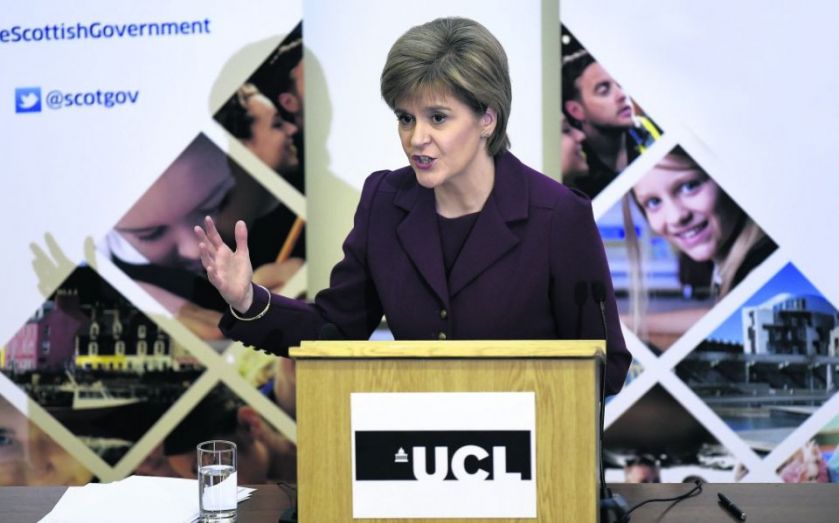SNP leader Nicola Sturgeon calls for boost to UK state spending

As the Scottish First Minister sets out her election agenda, Chris Papadopoullos reports from University College London
Scottish National Party (SNP) leader Nicola Sturgeon ventured to University College London (UCL) yesterday where she received the backing of loyalists and anti-cuts activists, as she laid out her election pledges.
“I am impressed with Sturgeon thus far, although it is early days,” Stevie Lochran, a researcher in
Energy and Economics at UCL, who is also an SNP member, told City A.M.
“She is tenacious and intelligent, both qualities she shares with Alex Salmond. However, Sturgeon does not carry that perceived arrogance that some rightly or wrongly accused her predecessor of. She comes across as more approachable and willing to work with others, while still maintaining an extremely high level of authority and presence.”
Lochran was speaking after attending Sturgeon’s crowd-pleasing diatribe against austerity in a keynote speech at University College London yesterday. He was not alone in his support for Sturgeon, whose attempts at humour were met with laughter, and jabs and at the Conservative party met with applause.
“The entire focus of the Westminster debate is on the deficit. Now, the deficit is hugely important. But it is a symptom of economic difficulties, not just a cause of them,” Sturgeon said.
“Debt should be reduced as a percentage of GDP – but more gradually than either of the largest UK parties is proposing.” She added that such a feat could be achieved by increasing government spending, but at a slower rate than growth.
The SNP leader said that raising real state spending by 0.5 per cent per year would reduce the nation’s debt while freeing an extra £180bn for investment over the next four years. One area she is happy to cut is the Trident renewal which would save £100bn over the next 35 years.
“We simply don’t accept that there’s a trade-off between balancing the books and having a balanced society; fairness and prosperity can go hand in hand.”
A big part of her speech was the focus on equality and fairness, but no major policies to that accord appear to have been drawn up yet.
Sturgeon’s words could soon be put into practice with the SNP gaining support in the run up to the May General Election.
George Buckley, chief economist at Deutsche Bank, believes that current polls point toward a Labour-SNP coalition. Such a result would see Sturgeon become deputy prime minister. However, Buckley notes that three months can be a long time in politics.
Members of the audience were also pleased by Sturgeon’s commitments to gender quotas on boards, a living wage and climate change goals.
However, she noted that gender quotas were a “blunt tool”.
Not everyone was pleased though. One student was left disappointed after enquiring whether the SNP would take a liberal stance on drugs. Sturgeon said she had no intention of changing the classifications on any substances. On the question of a third runway at Heathrow, she jokingly declined to comment for fear of being “lynched”.
Sturgeon also played down the UK’s recent economic boom, which has seen employment rise to record levels. The SNP leader said real wages, productivity and manufacturing output were all still below pre-recession levels.